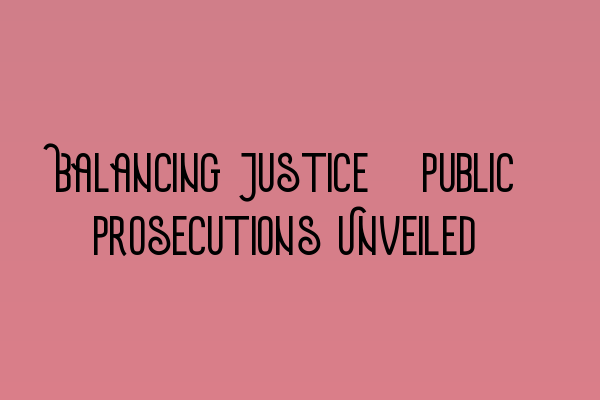Balancing Justice: Public Prosecutions Unveiled
Welcome to the SQE Criminal Law & Practice Law UK blog, where we bring you insightful articles about various aspects of criminal law. In this edition, we delve into the intriguing world of public prosecutions and explore how the pursuit of justice is meticulously balanced to ensure fairness and accountability.
Public prosecutions play a vital role in upholding the rule of law and maintaining a just society. They are conducted by the Crown Prosecution Service (CPS) in England and Wales, an independent body responsible for bringing criminal charges on behalf of the state. The CPS works closely with the police, gathering evidence, evaluating cases, and making decisions on whether to prosecute.
The Prosecution Process
The prosecution process begins with the police gathering evidence against a suspect. Once the evidence is collected, it is presented to the CPS for review. At this stage, the CPS carefully examines the evidence and considers whether it is sufficient to initiate criminal proceedings. The decision to prosecute is made in accordance with the Code for Crown Prosecutors, which sets out clear guidelines for the assessment of cases.
During the review process, the CPS takes into account various factors, including the strength and reliability of the evidence, the seriousness of the offense, the public interest, and any potential defenses raised by the suspect. This thorough evaluation ensures that only cases with a reasonable prospect of conviction proceed to court, thereby preventing unnecessary trials and preserving judicial resources.
Justice and Fairness
Ensuring justice and fairness is at the heart of the prosecution process. The CPS is committed to making impartial decisions based solely on the evidence and the public interest. This commitment extends to the disclosure of evidence to the defense, which is crucial to the accused’s right to a fair trial.
However, striking the right balance between justice and disclosure can be challenging. The CPS must weigh the need to protect sensitive information, such as national security or the privacy of witnesses, against the defendant’s right to a fair trial. This delicate balancing act requires the CPS to carefully consider each case’s unique circumstances and apply the law judiciously.
Continuous Improvement
To ensure the effectiveness and efficiency of public prosecutions, the CPS continuously strives for improvement. Regular reviews and evaluations of past cases help identify areas for development and enhancement. These improvements often lead to changes in policies, procedures, and training programs for prosecutors, enabling them to adapt to evolving legal frameworks and emerging trends in criminal behavior.
At SQE Criminal Law & Practice Law UK, we are dedicated to supporting aspiring criminal practitioners in preparing for the Solicitors Qualifying Examination (SQE) and excelling in their legal careers. If you’re interested in honing your skills, be sure to check out our SQE 1 Practice Exam Questions and SQE 1 Practice Mocks FLK1 FLK2 for comprehensive preparation. Our SQE 2 Preparation Courses and SQE 1 Preparation Courses are designed to equip you with the knowledge and skills necessary to succeed in the SQE exams.
Stay informed about the latest SRA SQE Exam Dates by visiting our website regularly. We provide up-to-date information to help you plan and prepare for the exams effectively.
Balancing justice in public prosecutions is a complex task that requires a meticulous approach. The CPS plays a crucial role in safeguarding the rights of both the accused and the wider society. By upholding the principles of fairness, impartiality, and continuous improvement, public prosecutions contribute to the maintenance of a just and equitable legal system.
